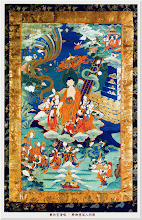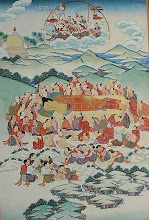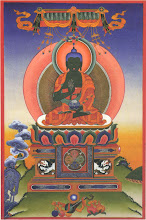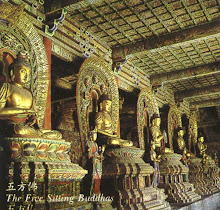By Sayadaw Bhaddanta Silanandabhivamsa, D.Litt
---o0o---
Buddhism is unique among religions in that it knows no ceremonies comparable to those in other religions. Ceremonies and rituals, elaborate and tiresome in performance, have no room in Buddhism. We do not find any instance in the Pali Canon where the Buddha lays down the rules and methods for the performance of ceremonies for the laity. It is left to the individual whether or not to perform them. He has only one thing which he must take into consideration, that is his performing of ceremonies does not clash with the teachings of the Buddha.
In the absence, then, of any rules governing the performance of ceremonies in Buddhism, man cannot but follow the customs of the place where he lives, provided that these customs do not go against the tenets of Buddhism.
If the customs or performance of the ceremonies do not accord with Buddhist religion, or if the religious compunction does not approve of them, then the method of performance, rather than the ceremony itself, should be adapted to suit the religious teachings, or an entirely new way of performing the ceremony should be sought for.
A man will want to do something of a ceremony when a child is born to him, or he has an occasion to give away his son or daughter in marriage, or at the time of death of other persons. The following are the ways of performing ceremonies in connexion with occasions mentioned above, and they are so arranged as to be acceptable to all Buddhists.
Friday, May 28, 2010
Saturday, May 22, 2010
Unravelling Meaning Of Life Through Buddhism
by Ajahn Brahmavamso, The Buddhist Channel, May 19, 2008
A Wesak reflection on the basics of the Buddha's teachings
Kuala Lumpur, Malaysia -- Today, Buddhism continues to gain ever-wider acceptance in many lands far beyond its original home. The Buddhist Teaching of the Law of Kamma offers our society a just and incorruptible foundation and reason for the practice of a moral life. It is easy to see how a wider embracing of the Law of Kamma would lead any country towards a stronger, more caring and virtuous society.
The Teaching of Rebirth places this present short lifetime of ours in a broader perspective, giving more meaning to the vital events of birth and death. The understanding of rebirth removes so much of the tragedy and grief surrounding death and turns one's attention to the quality of a lifetime, rather than its mere length.
From the very beginning, the practice of meditation has been at the very heart of the Buddhist Way. Today, meditation grows increasingly popular as the proven benefits to both mental and physical well being become more widely known. When stress is shown to be such a major cause of human suffering, the quieting practice of meditation becomes ever more valued.
Today's world is too small and vulnerable to live angry and alone, thus the need for tolerance, love and compassion is important. These qualities of mind essential for happiness are formally developed in Buddhist meditation and then diligently put into practice in everyday life.
Forgiveness and gentle tolerance, harmlessness and peaceful compassion are well known trademarks of Buddhism, they are given freely and broadly to all kinds of beings, including animals of course, and also, most importantly, to oneself. There is no place for dwelling in guilt or self-hatred in Buddhism, not even a place for feeling guilty about feeling guilty!
A Wesak reflection on the basics of the Buddha's teachings
Kuala Lumpur, Malaysia -- Today, Buddhism continues to gain ever-wider acceptance in many lands far beyond its original home. The Buddhist Teaching of the Law of Kamma offers our society a just and incorruptible foundation and reason for the practice of a moral life. It is easy to see how a wider embracing of the Law of Kamma would lead any country towards a stronger, more caring and virtuous society.
The Teaching of Rebirth places this present short lifetime of ours in a broader perspective, giving more meaning to the vital events of birth and death. The understanding of rebirth removes so much of the tragedy and grief surrounding death and turns one's attention to the quality of a lifetime, rather than its mere length.
From the very beginning, the practice of meditation has been at the very heart of the Buddhist Way. Today, meditation grows increasingly popular as the proven benefits to both mental and physical well being become more widely known. When stress is shown to be such a major cause of human suffering, the quieting practice of meditation becomes ever more valued.
Today's world is too small and vulnerable to live angry and alone, thus the need for tolerance, love and compassion is important. These qualities of mind essential for happiness are formally developed in Buddhist meditation and then diligently put into practice in everyday life.
Forgiveness and gentle tolerance, harmlessness and peaceful compassion are well known trademarks of Buddhism, they are given freely and broadly to all kinds of beings, including animals of course, and also, most importantly, to oneself. There is no place for dwelling in guilt or self-hatred in Buddhism, not even a place for feeling guilty about feeling guilty!
Saturday, May 8, 2010
The Problem With Sex in Buddhism
by Kusala Bhikshu
(From a talk given at a High School in Los Angeles.)
It seems these days in Los Angeles, it's OK to do or be anything you want sexually... And if you're lucky enough to find your true sexual identity, you will be happy and fulfilled the rest of your life.
Well, in this world of *Samsara it just doesn't work that way.
The Buddha more than anything else was a man, who went from childhood to manhood, got married, and at the age of 29 had his first child. He went through all the stages men go through sexually, but at the age of 35 ended his sexual desire forever in *Nirvana.
The big question today is... Does the desire for sex always lead to suffering? The answer is, Yes! But the reason may surprise you.
The Buddha in everything he said about sex implies... The activity of sex will never ultimately satisfy the desire for sex.
Now this is a real bummer if you think about it. You can have sex a 1000 times, and want it a 1001. You can be 90 years old... Blind and cripple... Still want to have sex, and not be physically able to. You will never get rid of your sexual desire by having sex. In fact, it seems the more sex you have, the more sex you want.
(From a talk given at a High School in Los Angeles.)
It seems these days in Los Angeles, it's OK to do or be anything you want sexually... And if you're lucky enough to find your true sexual identity, you will be happy and fulfilled the rest of your life.
Well, in this world of *Samsara it just doesn't work that way.
The Buddha more than anything else was a man, who went from childhood to manhood, got married, and at the age of 29 had his first child. He went through all the stages men go through sexually, but at the age of 35 ended his sexual desire forever in *Nirvana.
The big question today is... Does the desire for sex always lead to suffering? The answer is, Yes! But the reason may surprise you.
The Buddha in everything he said about sex implies... The activity of sex will never ultimately satisfy the desire for sex.
Now this is a real bummer if you think about it. You can have sex a 1000 times, and want it a 1001. You can be 90 years old... Blind and cripple... Still want to have sex, and not be physically able to. You will never get rid of your sexual desire by having sex. In fact, it seems the more sex you have, the more sex you want.
Subscribe to:
Posts (Atom)


























.jpg)














